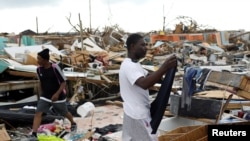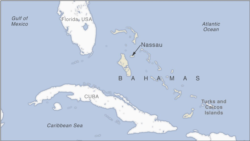U.N. and international agencies are scaling up relief efforts as more areas in hurricane-battered islands of the Bahamas become accessible. The World Health Organization has sent three emergency medical teams to cope with growing health needs spawned by the recent onslaught of Hurricane Dorian.
Two emergency medical teams arrived in the Bahamas Friday and a third is expected on Saturday. While life-saving search and rescue operations are ongoing, the World Health Organization is focusing on clinical care to save the lives of hurricane survivors.
The manager of WHO's Emergency Medical Teams Initiative, Ian Norton, says the hospital in the Grand Bahama city of Freeport has been flooded with sewage-contaminated water and needs to be temporarily replaced with a field hospital. He says other clinics on the islands have been destroyed or damaged and will have to be replaced.
Although Norton expects the current death toll of 30 to rise, he says he does not expect to see huge numbers of injured people.
“We see unfortunately a lot of people drowned and losing their lives or surviving. But we do not see those who are injured surviving, so therefore we do not see large numbers afterwards. What we do see are needs related to background health, particularly in the Bahamas. They have 13 percent diabetes…We also see a lot of renal disease in Pacific and Caribbean countries and those patients need our special attention,” Norton.
Another concern, Norton said, is an expected outbreak of vector-borne and mosquito-borne diseases as the stagnant flood waters start to get repopulated by mosquitos. As the death toll rises, he told VOA, dead body management will become more important. Norton said special protocols and procedures on handling the dead bodies will have to be followed.
“It does not cause outbreaks of disease. Dead bodies do not cause disease. There are respectful and culturally appropriate ways of managing and we need to focus on that. Not start spreading rumors that piles of bodies will cause disease to the population that is left. That does not happen,” Norton said.
Before the hurricane struck, the WHO-linked Pan American Health Organization, had sent experts in water and sanitation and health services to the islands. Experts in logistics, disease surveillance, coordination and other areas of need also are on the ground to help with the relief effort.







